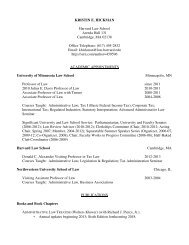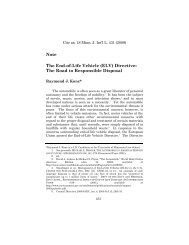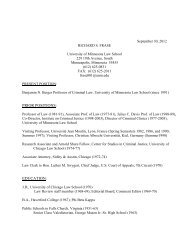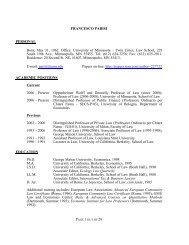Enabling Private Ordering - the University of Minnesota Law School
Enabling Private Ordering - the University of Minnesota Law School
Enabling Private Ordering - the University of Minnesota Law School
You also want an ePaper? Increase the reach of your titles
YUMPU automatically turns print PDFs into web optimized ePapers that Google loves.
2009] UMBRELLA CLAUSES 13<br />
State contracts as recognized under customary international<br />
law.<br />
Finally, Part V examines <strong>the</strong> scope <strong>of</strong> <strong>the</strong> umbrella clause<br />
ratione materiae and analyzes <strong>the</strong> kind <strong>of</strong> commitments <strong>the</strong><br />
clauses cover. It argues that umbrella clauses cover contractual<br />
as well as such quasi-contractual commitments that can be<br />
viewed as a substitute for an investor-State contract, even<br />
though <strong>the</strong>y may take <strong>the</strong> form <strong>of</strong> unilateral acts by <strong>the</strong> host<br />
State or emanate from its domestic legislation. It is, however,<br />
crucial that such promises relate to an investment as defined in<br />
<strong>the</strong> respective investment treaty. This article submits, <strong>the</strong>refore,<br />
that umbrella clauses break with <strong>the</strong> limited protection <strong>of</strong> host<br />
State promises under international law by establishing <strong>the</strong><br />
jurisdiction <strong>of</strong> investment tribunals for any breach <strong>of</strong> such<br />
promises. They are not limited to protecting against<br />
expropriatory, discriminatory, or arbitrary conduct, but<br />
comprehensively aim at providing an infrastructure that backs<br />
up “private ordering” between investors and States.<br />
II. THE DUALIST FRAMEWORK’S LIMITATIONS TO<br />
EFFICIENT INVESTOR-STATE CONTRACTING<br />
Arbitral jurisprudence on <strong>the</strong> umbrella clause is<br />
fundamentally divided between an approach that gives effect to<br />
<strong>the</strong> plain meaning <strong>of</strong> <strong>the</strong> clauses and a more restrictive<br />
approach that focuses on systemic issues concerning <strong>the</strong><br />
relationship between municipal and international law, contract<br />
claims and treaty claims. The first approach considers that any<br />
breach <strong>of</strong> a promise made by <strong>the</strong> host State vis-á-vis a foreign<br />
investor gives rise to a violation <strong>of</strong> <strong>the</strong> umbrella clause and,<br />
accordingly, entitles <strong>the</strong> investor to damages. 21 This approach<br />
mainly relies on three arguments. First, it stresses <strong>the</strong> plain<br />
wording <strong>of</strong> <strong>the</strong> clauses that in most cases “say clearly, that each<br />
Contracting Party shall observe any legal obligation it has<br />
assumed, or will in <strong>the</strong> future assume, with regard to specific<br />
investments covered by <strong>the</strong> BIT.” 22 Second, it stresses <strong>the</strong><br />
21. See cases cited supra note 6.<br />
22. SGS Société Générale de Surveillance S.A. v. Republic <strong>of</strong> <strong>the</strong> Philippines,<br />
ICSID (W. Bank) Case No. ARB/02/6, Decision on Objections to Jurisdiction, para.<br />
115 (Jan. 29, 2004); see also Noble Ventures, Inc. v. Romania, ICSID (W. Bank) Case<br />
No. ARB/01/11, Award, para. 51 (Oct. 12, 2005); Siemens A.G. v. Argentine Republic,<br />
ICSID (W. Bank) Case No. ARB/02/8, Award, para. 204 (Feb. 6, 2007); Eureko, supra<br />
note 6, para. 246.
















